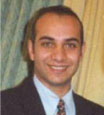PROGRAM → INVITED TALKS
| Title: General Type-2 Fuzzy Logic Systems to enable Better Uncertainty Handling for Real World Application | |
 |
Hani Hagras The Computational Intelligence Centre School of Computer Science and Electronic Engineering University of Essex United Kingdom |
| Abstract: This speech will explain the concepts of interval and general type-2 Fuzzy Logic Systems (FLSs) and will present a new framework to design general type-2 FLS. The proposed approach will lead to a significant reduction in both the complexity and the computational requirements for general type-2 FLSs while offering the capability of representing complex general type-2 fuzzy sets. This speech will explain how the proposed approach can present a way forward for fuzzy systems in real world environments and applications that face high levels of uncertainties. The talk will present different ways to design singleton and non-singleton interval and general type-2 FLSs. The talk will also present the successful application of type-2 FLSs to many real world settings including industrial environments, mobile robots, ambient intelligent environments video congestion control and intelligent decision support systems. The talk will conclude with an overview on the future directions of type-2 FLSs. |
|
| Title: Dataset Shift in Classification: Approaches and Problems | |
 |
Francisco Herrera Full Professor Head of Research Group SCI2S (Soft Computing and Intelligent Information Systems) Department of Computer Science and Artificial Intelligence ETS de Ingenierias Informática y de Telecomunicación University of Granada, E-18071 Granada, Spain Tel: +34-958-240598 - Fax: +34-958-243317 E-mail: herrera@decsai.ugr.es |
Abstract: Under the term âDataset Shift" are unified the different names (fracture between data, changing environments, contrast mining in classification learning, among others) to refer to the same basic idea, when training and test joint distributions are different, and therefore the classifiers donât present good performance. The aim of this talks is to shortly review this topic, providing researchers unfamiliar with the topic a brief introduction to it. We present the some of the most common factors to produce dataset shift, including sample selection bias. We analyze some of the attempts in the literature to work under dataset shift conditions. |
|
| Title: Bayesian machine learning for decoding the brain | |
 |
Tom Heskes |
Abstract: |
|

